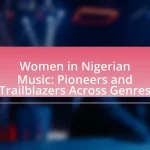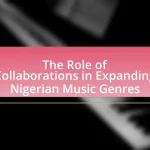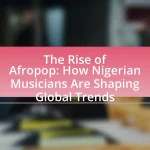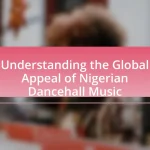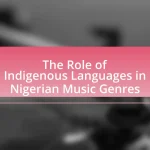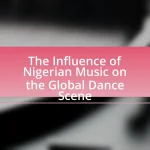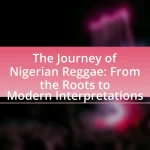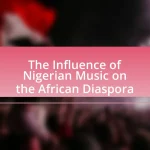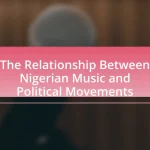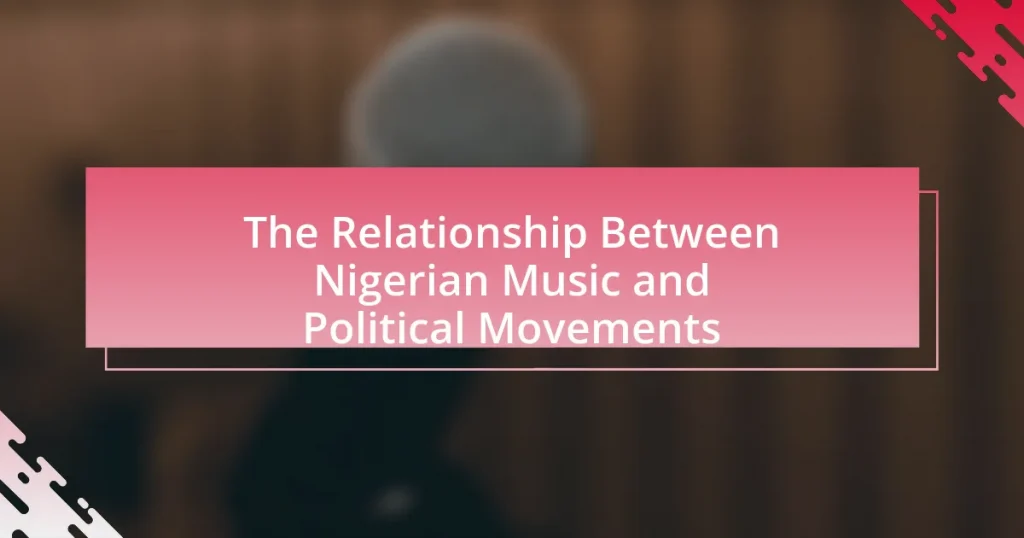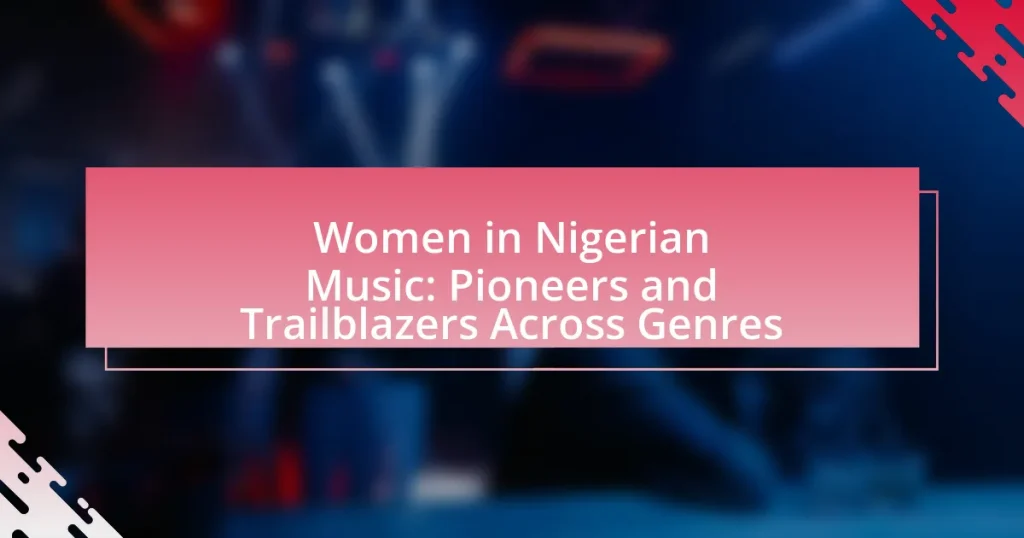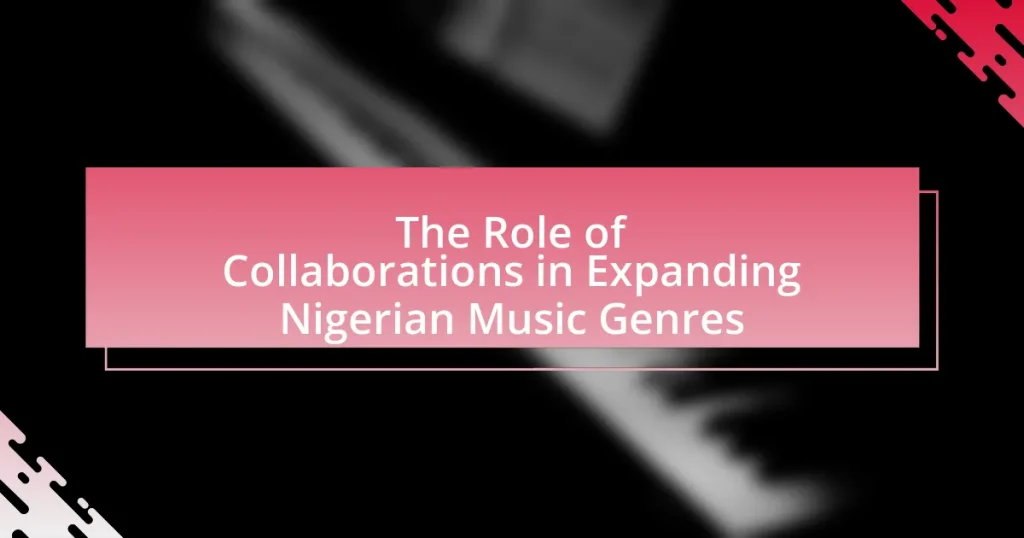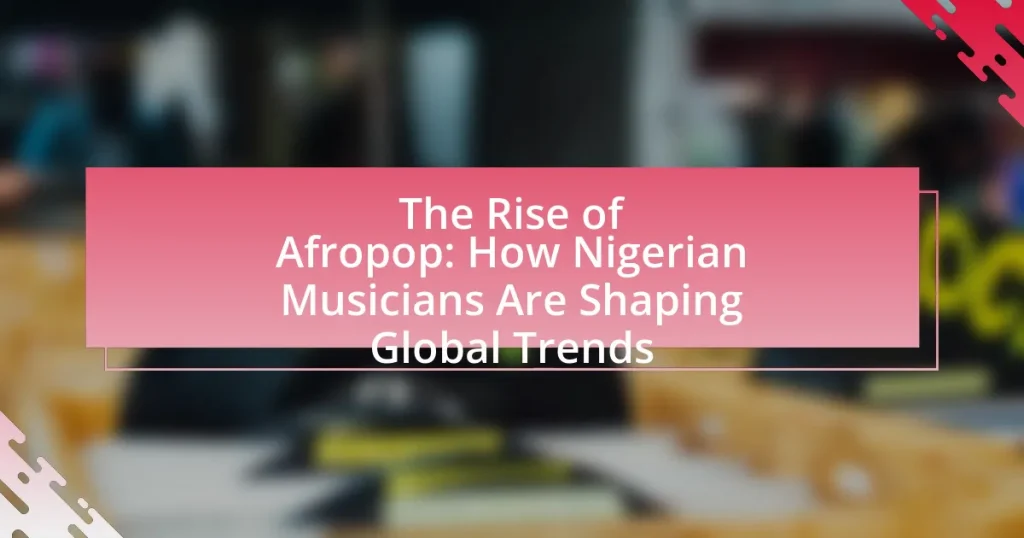The article examines the relationship between Nigerian music and political movements, highlighting how music has historically served as a tool for political expression and activism. It discusses the role of prominent artists like Fela Kuti, Burna Boy, and Wizkid in addressing social issues such as government corruption, police brutality, and human rights abuses through their music. Key events, including the Nigerian Civil War and the #EndSARS protests, illustrate how music has mobilized public sentiment and inspired collective action. The article also explores the challenges musicians face, such as government censorship and societal backlash, while emphasizing the impact of music on public perception and political discourse in Nigeria.
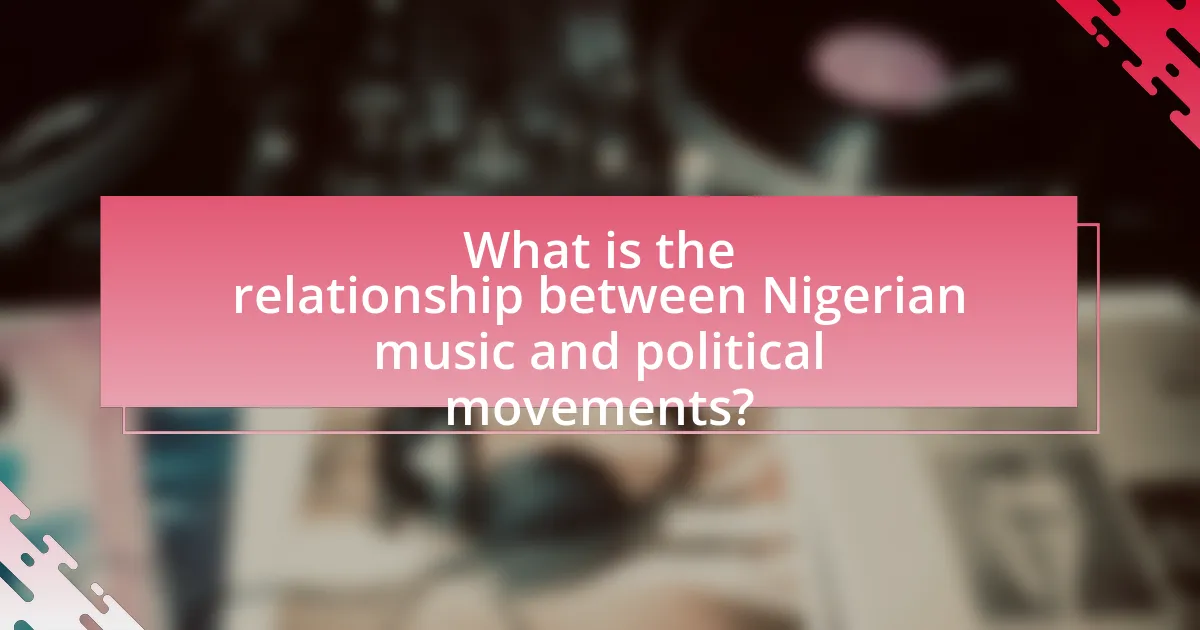
What is the relationship between Nigerian music and political movements?
Nigerian music has historically served as a powerful tool for political expression and activism. Artists use their platforms to address social issues, critique government policies, and mobilize public sentiment. For instance, during the military dictatorship in Nigeria, musicians like Fela Kuti used Afrobeat to protest against government corruption and human rights abuses, leading to significant public awareness and resistance movements. Additionally, contemporary artists continue this tradition, with songs addressing issues such as police brutality and social justice, exemplified by the #EndSARS movement in 2020, where music played a crucial role in rallying support and spreading awareness. This relationship underscores the integral role of music in shaping political discourse and influencing change in Nigeria.
How has Nigerian music historically influenced political movements?
Nigerian music has historically influenced political movements by serving as a powerful tool for social commentary and mobilization. For instance, during the Nigerian Civil War (1967-1970), artists like Fela Kuti used music to critique government policies and military actions, galvanizing public sentiment against oppression. Additionally, the genre of Afrobeat emerged as a response to political corruption and social injustice, with Fela’s songs often addressing issues such as human rights abuses and the need for democratic governance. This musical activism not only raised awareness but also inspired collective action, as seen in the protests against military rule in the 1980s and 1990s, where music became anthems for resistance. Thus, Nigerian music has played a crucial role in shaping political discourse and fostering movements aimed at social change.
What key events in Nigerian history have been shaped by music?
Key events in Nigerian history shaped by music include the Nigerian Civil War (1967-1970), where songs like “Sweet Mother” by Prince Nico Mbarga became anthems of resilience and unity. Additionally, the music of Fela Kuti during the 1970s and 1980s played a crucial role in the fight against military dictatorship, with his Afrobeat genre serving as a platform for political activism and social commentary. The End SARS protests in 2020 also saw music as a vital tool for mobilization and expression, with artists like Burna Boy and Wizkid using their platforms to amplify the call for police reform and justice. These instances illustrate how music has been integral to political movements and social change in Nigeria.
How did music serve as a form of protest during political unrest?
Music served as a powerful form of protest during political unrest by conveying messages of resistance and solidarity among the oppressed. In Nigeria, artists like Fela Kuti used Afrobeat to address issues such as government corruption and human rights abuses, directly challenging the political status quo. His song “Zombie,” which criticized the military regime, became an anthem for resistance, illustrating how music can mobilize public sentiment and inspire collective action. Additionally, during the End SARS protests in 2020, contemporary Nigerian musicians utilized social media to share protest songs that resonated with the youth, amplifying calls for police reform and accountability. This demonstrates that music not only reflects societal grievances but also serves as a catalyst for political change.
What role do musicians play in political activism in Nigeria?
Musicians in Nigeria play a crucial role in political activism by using their platforms to raise awareness about social issues and mobilize the public for change. They often address topics such as corruption, human rights abuses, and government accountability through their lyrics and performances. For instance, artists like Fela Kuti historically used Afrobeat music to critique the Nigerian government, influencing public opinion and inspiring protests. More recently, musicians like Burna Boy and Wizkid have participated in movements like #EndSARS, which protested police brutality, further demonstrating the impact of music in galvanizing youth activism and fostering political discourse in Nigeria.
Which prominent Nigerian artists have engaged in political activism?
Prominent Nigerian artists who have engaged in political activism include Fela Kuti, Burna Boy, and Wizkid. Fela Kuti, known as the pioneer of Afrobeat, used his music to criticize government corruption and human rights abuses in Nigeria during the 1970s and 1980s, often facing persecution for his outspoken views. Burna Boy has been vocal about the End SARS movement, which protests against police brutality in Nigeria, using his platform to raise awareness and support for the cause. Wizkid has also participated in activism, particularly in relation to the End SARS protests, advocating for social justice and reform through his music and public statements. These artists exemplify the intersection of music and political movements in Nigeria, using their influence to address societal issues.
How do musicians use their platforms to address political issues?
Musicians use their platforms to address political issues by creating songs that reflect social injustices and mobilizing their audiences for activism. For instance, Nigerian artists like Fela Kuti and Burna Boy have utilized their music to critique government corruption and advocate for social change, with Fela’s “Zombie” directly challenging military rule in Nigeria. Additionally, musicians often engage in public performances, social media campaigns, and collaborations with activist organizations to amplify their messages, as seen in Burna Boy’s involvement in the #EndSARS movement against police brutality in Nigeria. These actions demonstrate how musicians leverage their influence to raise awareness and inspire collective action on pressing political matters.
Why is music considered a powerful tool for political expression in Nigeria?
Music is considered a powerful tool for political expression in Nigeria because it serves as a medium for conveying social and political messages, mobilizing communities, and fostering national identity. Historically, Nigerian musicians have used their art to address issues such as corruption, human rights abuses, and social injustice, often resonating with the public’s sentiments. For instance, during the military dictatorship of the 1980s and 1990s, artists like Fela Kuti used Afrobeat to critique the government, leading to widespread awareness and activism among the populace. This ability to influence public opinion and inspire collective action underscores music’s role as a catalyst for political change in Nigeria.
What cultural factors contribute to the impact of music on political movements?
Cultural factors such as shared identity, historical context, and social narratives significantly contribute to the impact of music on political movements. Shared identity fosters a sense of unity among individuals, allowing music to serve as a rallying cry for collective action, as seen in Nigeria’s use of music during the fight against military dictatorship in the 1980s. Historical context provides a backdrop that influences the themes and messages in music, which can resonate with the struggles of a population; for instance, Fela Kuti’s Afrobeat music addressed issues of corruption and oppression, galvanizing public sentiment. Social narratives, shaped by cultural storytelling traditions, enable music to articulate grievances and aspirations, making it a powerful tool for mobilization and awareness, as evidenced by the role of protest songs in the #EndSARS movement against police brutality in Nigeria.
How does music resonate with the Nigerian populace during political crises?
Music serves as a powerful tool for expression and solidarity among the Nigerian populace during political crises. It resonates deeply by reflecting the collective sentiments of frustration, hope, and resistance against oppressive regimes. For instance, during the #EndSARS protests in 2020, songs like “This is Nigeria” by Falz became anthems that encapsulated the youth’s demand for police reform and accountability, illustrating how music can mobilize and unify people around a common cause. Additionally, historical contexts, such as the music of Fela Kuti during Nigeria’s military dictatorship, demonstrate how artists have used their platforms to critique governance and inspire social change, reinforcing the idea that music is not just entertainment but a vital part of political discourse in Nigeria.
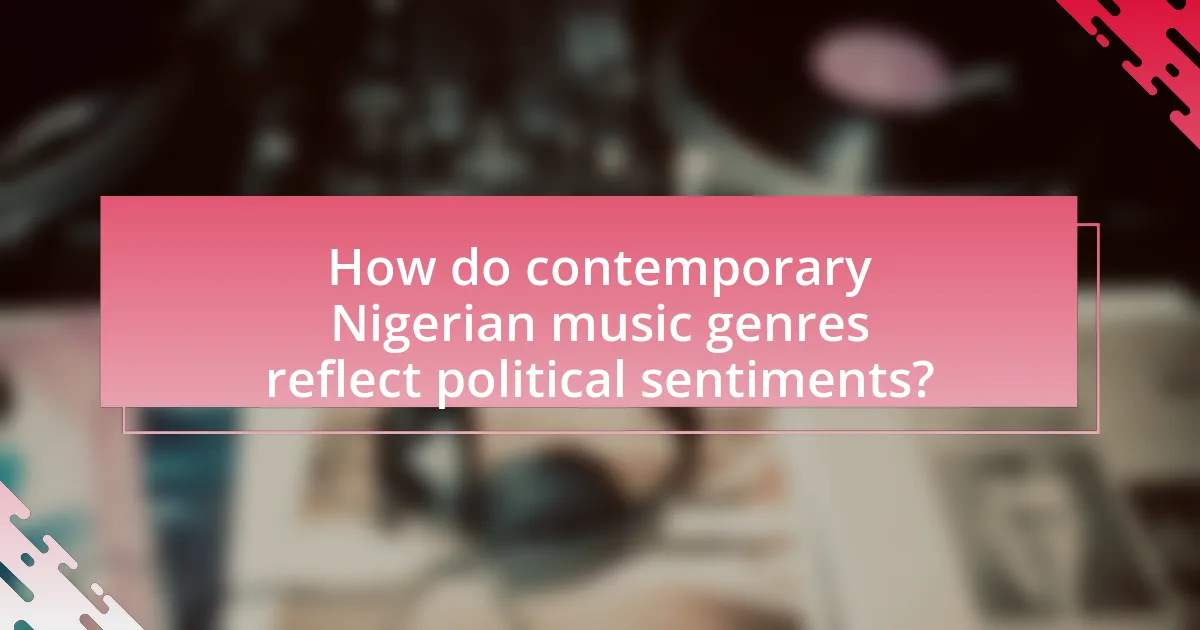
How do contemporary Nigerian music genres reflect political sentiments?
Contemporary Nigerian music genres reflect political sentiments by serving as platforms for social commentary and activism. Genres such as Afrobeats and hip-hop often address issues like corruption, governance, and social justice, resonating with the public’s frustrations. For instance, artists like Burna Boy and Falz have used their music to critique government policies and advocate for change, particularly during movements like #EndSARS, which protested police brutality in Nigeria. The lyrics and themes in their songs often mirror the collective consciousness of the youth, highlighting their desire for accountability and reform. This connection between music and political expression illustrates how contemporary Nigerian artists engage with and influence societal issues.
What are the main genres of Nigerian music that engage with political themes?
The main genres of Nigerian music that engage with political themes are Afrobeat, Highlife, and Hip Hop. Afrobeat, popularized by Fela Kuti, is known for its fusion of jazz, funk, and traditional African rhythms, often addressing issues like corruption and social justice. Highlife, originating from the early 20th century, incorporates Western musical elements and frequently reflects on societal challenges and political issues in its lyrics. Nigerian Hip Hop has emerged as a powerful medium for youth expression, tackling contemporary political issues, governance, and social change through its lyrics and performances. These genres collectively serve as platforms for political discourse and activism in Nigeria.
How does Afrobeats address social and political issues?
Afrobeats addresses social and political issues by using music as a platform to raise awareness and inspire change. Artists like Burna Boy and Fela Kuti have incorporated themes of corruption, inequality, and social justice into their lyrics, directly reflecting the struggles faced by Nigerians. For instance, Burna Boy’s song “Anybody” critiques government negligence and societal issues, while Fela Kuti’s work in the 1970s and 1980s openly challenged the military dictatorship in Nigeria. This genre not only entertains but also mobilizes listeners, encouraging them to engage in political discourse and activism, thereby reinforcing the connection between music and social movements in Nigeria.
What messages are conveyed through Hip Hop in Nigeria?
Hip Hop in Nigeria conveys messages of social justice, political awareness, and cultural identity. Artists use their music to address issues such as corruption, inequality, and human rights abuses, reflecting the socio-political landscape of the country. For instance, songs by artists like Falz and M.I Abaga often critique government policies and advocate for change, resonating with the youth who seek accountability and reform. This genre serves as a platform for activism, encouraging listeners to engage in political discourse and social movements, thereby reinforcing the connection between music and political movements in Nigeria.
How do lyrics in Nigerian music reflect political realities?
Lyrics in Nigerian music often serve as a powerful commentary on political realities, addressing issues such as corruption, social injustice, and government oppression. For instance, artists like Fela Kuti used Afrobeat to critique the Nigerian government, highlighting the struggles of the populace against authoritarian rule. His song “Zombie” explicitly criticized the military regime, reflecting widespread discontent and mobilizing public sentiment against oppressive governance. Additionally, contemporary artists like Burna Boy and Wizkid incorporate themes of activism and social change in their lyrics, resonating with the youth’s desire for reform, as seen in songs like “Another One” and “Joro.” These lyrics not only mirror the socio-political landscape but also inspire collective action and awareness among listeners, reinforcing the integral role of music in political discourse in Nigeria.
What common themes are found in politically charged Nigerian songs?
Common themes found in politically charged Nigerian songs include social justice, corruption, and national identity. These songs often address issues such as government accountability, human rights abuses, and the struggles of the common people against oppressive regimes. For instance, artists like Fela Kuti have historically used their music to critique the Nigerian government and highlight the plight of citizens, making their work a form of activism. Additionally, contemporary musicians continue this tradition by incorporating themes of protest and resistance, reflecting the ongoing socio-political challenges in Nigeria.
How do artists use metaphors to critique political situations?
Artists use metaphors to critique political situations by embedding complex social and political commentary within their creative expressions. For instance, Nigerian musicians often employ metaphors related to everyday life, folklore, and cultural symbols to highlight issues such as corruption, oppression, and social injustice. A notable example is Fela Kuti, whose song “Zombie” uses military imagery as a metaphor for blind obedience to authority, effectively critiquing the Nigerian military regime of the 1970s. This method allows artists to convey powerful messages in a way that resonates with audiences, making the critique more impactful and accessible.
What impact does music have on public perception of political issues?
Music significantly influences public perception of political issues by shaping emotions, fostering collective identity, and mobilizing social movements. In Nigeria, for example, artists like Fela Kuti used music to critique government corruption and human rights abuses, effectively raising awareness and galvanizing public sentiment against oppressive regimes. Research indicates that music can serve as a powerful tool for political expression, with songs often becoming anthems for movements, thereby altering how the public engages with political discourse. This impact is evident in the way music resonates with listeners, creating a shared understanding and urgency around specific political issues, ultimately driving social change.
How do music videos enhance the political messages in songs?
Music videos enhance the political messages in songs by visually representing themes and narratives that resonate with social and political issues. For instance, in Nigerian music, videos often depict scenes of protests, social injustice, and cultural identity, which amplify the song’s message and engage viewers emotionally. A notable example is the music video for “This Is Nigeria” by Falz, which uses powerful imagery to address corruption and societal challenges, thereby reinforcing the political commentary within the lyrics. This combination of audio and visual elements creates a more impactful experience, making the political messages more accessible and memorable to the audience.
What role does social media play in amplifying these messages?
Social media plays a crucial role in amplifying messages related to Nigerian music and political movements by providing a platform for rapid dissemination and engagement. It enables artists and activists to share their messages widely, reaching diverse audiences instantly. For instance, during the #EndSARS protests in Nigeria, social media platforms like Twitter and Instagram were instrumental in mobilizing support and spreading awareness about police brutality, with millions of posts and shares amplifying the movement’s message globally. This immediate and extensive reach enhances visibility and fosters community engagement, making social media a powerful tool for political expression and activism in the context of Nigerian music and its relationship with social movements.
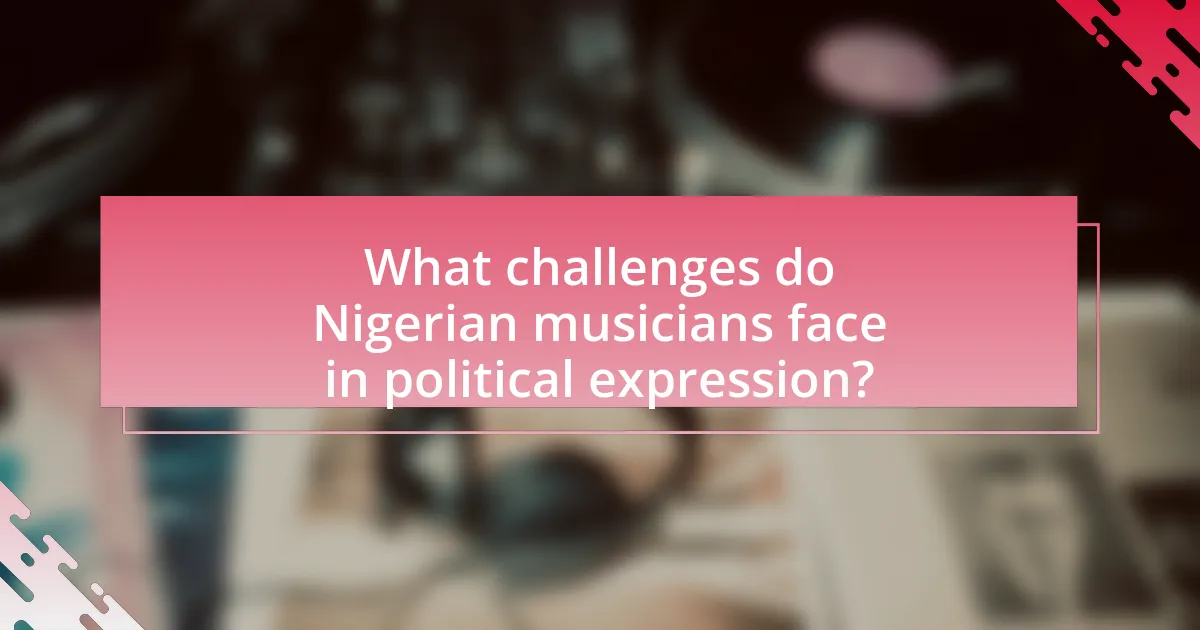
What challenges do Nigerian musicians face in political expression?
Nigerian musicians face significant challenges in political expression, primarily due to government censorship, societal backlash, and threats to personal safety. Government censorship often manifests through regulations that restrict the content of music, leading to self-censorship among artists who fear repercussions. For instance, the Nigerian Broadcasting Commission has previously banned songs that criticize the government or address sensitive political issues. Additionally, societal backlash can occur when musicians express dissenting views, resulting in public criticism or ostracism from certain community segments. Threats to personal safety are also prevalent, as musicians who engage in political discourse may face harassment or violence from both state and non-state actors, exemplified by the experiences of artists like Falz and Burna Boy, who have faced intimidation for their outspoken views.
How does government censorship affect musical expression in Nigeria?
Government censorship significantly restricts musical expression in Nigeria by limiting artists’ ability to critique the government and address social issues. This suppression leads to self-censorship among musicians, who may avoid controversial topics to evade repercussions, such as arrest or loss of performance opportunities. For instance, the Nigerian government has historically banned songs that criticize political leaders or highlight corruption, as seen with the 2019 ban on certain tracks by artists like Falz and Naira Marley. Consequently, this environment stifles creativity and reduces the diversity of voices in the music industry, ultimately impacting the role of music as a tool for social change and political commentary.
What are the consequences for artists who criticize the government?
Artists who criticize the government in Nigeria often face severe consequences, including censorship, harassment, and legal repercussions. For instance, the Nigerian government has been known to arrest musicians for their lyrics that challenge political authority, as seen in the case of the artist Naira Marley, who faced legal issues for his outspoken views. Additionally, artists may experience social backlash, loss of sponsorships, and threats to their safety, which can stifle their creative expression and limit their ability to engage in political discourse. These consequences highlight the risks involved in using music as a platform for political critique in Nigeria.
How do musicians navigate the risks of political commentary?
Musicians navigate the risks of political commentary by carefully balancing their artistic expression with the potential repercussions of their statements. They often employ metaphorical language and allegory to convey political messages without directly confronting authorities, which minimizes backlash. For instance, Nigerian artists like Fela Kuti used Afrobeat to critique government corruption while maintaining a level of ambiguity that protected them from direct censorship. Additionally, musicians may engage in grassroots movements or collaborate with activists to amplify their messages, thereby sharing the risks associated with political expression. This strategic approach allows them to influence public opinion while mitigating personal and professional risks.
What societal pressures influence the political content of Nigerian music?
Societal pressures such as government censorship, economic instability, and social inequality significantly influence the political content of Nigerian music. Government censorship restricts artists from expressing dissenting views, leading to coded messages in lyrics to circumvent restrictions. Economic instability, characterized by high unemployment and poverty rates, drives musicians to address issues of corruption and mismanagement, reflecting the struggles of the populace. Additionally, social inequality, particularly along ethnic and regional lines, compels artists to highlight injustices and advocate for unity, as seen in the works of prominent musicians like Fela Kuti, who used his platform to challenge the status quo and inspire political activism.
How do cultural expectations shape the themes in music?
Cultural expectations significantly shape the themes in music by influencing the content, style, and messages conveyed in songs. In Nigeria, for instance, music often reflects societal values, political sentiments, and communal experiences, aligning with the expectations of the audience. This is evident in genres like Afrobeat, where artists like Fela Kuti used their music to address political corruption and social injustice, resonating with the collective frustrations of the populace. The themes in such music are not only a reflection of personal expression but also a response to the cultural context, as artists navigate the expectations of their listeners while addressing pressing societal issues.
What role do fans play in supporting or opposing political messages in music?
Fans play a crucial role in supporting or opposing political messages in music by influencing the popularity and reach of those messages. When fans resonate with political themes in songs, they amplify the artist’s message through social media sharing, concert attendance, and merchandise purchases, thereby increasing visibility and impact. For instance, during Nigeria’s #EndSARS movement, fans actively supported artists like Falz and Runtown, who used their platforms to address police brutality, leading to widespread engagement and mobilization among youth. Conversely, fans can also oppose political messages by boycotting artists or expressing dissent through social media, which can diminish an artist’s influence and marketability. This dynamic illustrates how fan engagement directly shapes the political landscape within the music industry.
What strategies can musicians employ to promote political change through their art?
Musicians can promote political change through their art by using lyrical content that addresses social issues, engaging in activism, and collaborating with grassroots movements. By writing songs that highlight injustices, such as police brutality or corruption, artists can raise awareness and inspire listeners to take action. For instance, Fela Kuti’s music directly challenged the Nigerian government and inspired political activism during the 1970s and 1980s. Additionally, musicians can participate in protests, using their platforms to amplify messages and mobilize supporters. Collaborating with organizations focused on social change can also enhance the impact of their art, as seen in the partnership between artists and NGOs during campaigns for human rights in Nigeria. These strategies effectively leverage music as a tool for political engagement and transformation.
How can collaborations enhance the impact of politically charged music?
Collaborations can enhance the impact of politically charged music by combining diverse voices and perspectives, which amplifies the message and reaches a broader audience. For instance, when artists from different genres or backgrounds collaborate, they create a fusion that can resonate with various demographic groups, thereby increasing the song’s relevance and influence. A notable example is the collaboration between Nigerian artists like Fela Kuti and various international musicians, which not only brought attention to local political issues but also highlighted global struggles for justice and equality. This cross-cultural engagement fosters solidarity and encourages listeners to engage with the political themes presented in the music, ultimately driving social change.
What are effective ways for artists to engage with their audience on political issues?
Artists can effectively engage with their audience on political issues by using their music as a platform for social commentary and activism. For instance, Nigerian artists like Fela Kuti have historically addressed political corruption and social injustice through their lyrics, which resonate deeply with listeners and inspire action. Additionally, artists can leverage social media to amplify their messages, creating interactive campaigns that encourage audience participation and dialogue. Collaborating with grassroots organizations can also enhance their impact, as seen in initiatives where musicians partner with NGOs to raise awareness about specific political causes. These methods not only foster a sense of community but also mobilize audiences towards collective action, demonstrating the powerful role of music in political movements.
